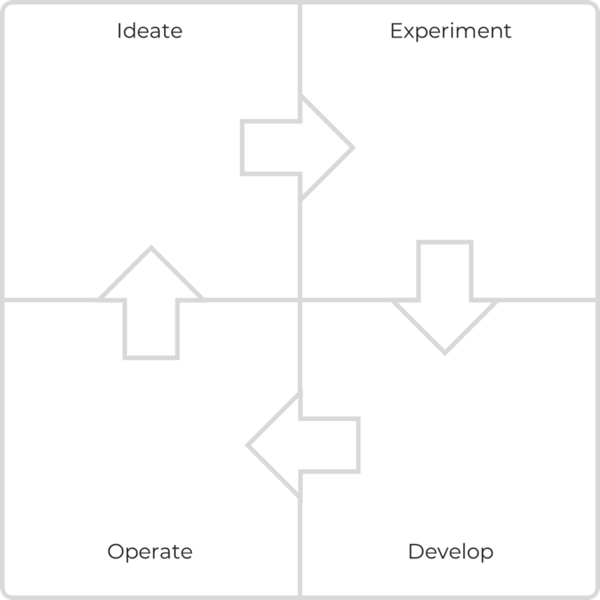ATD Blog
Leading Talent Development Innovation
Wed Mar 22 2023

Content
Today’s talent development (TD) leaders must navigate disruptive change like never before. As a result, organizations must find ways to create meaningful learning experiences that engage learners and drive organizational performance.
Today’s talent development (TD) leaders must navigate disruptive change like never before. As a result, organizations must find ways to create meaningful learning experiences that engage learners and drive organizational performance.
Content
Historically, talent development has been the process of helping individuals and organizations acquire, maintain, and improve the knowledge, skills, and abilities they need to achieve organizational results. The traditional methods to achieve this include classroom-based instruction, e-learning, and on-the-job training. Unfortunately, these methods can often be time-consuming, costly, and difficult to measure or align with organizational performance metrics.
Historically, talent development has been the process of helping individuals and organizations acquire, maintain, and improve the knowledge, skills, and abilities they need to achieve organizational results. The traditional methods to achieve this include classroom-based instruction, e-learning, and on-the-job training. Unfortunately, these methods can often be time-consuming, costly, and difficult to measure or align with organizational performance metrics.
Content
As the world of work evolves, so does the need to reimagine how talent development helps people and organizations thrive in an unpredictable future. This article explores ways TD leaders can navigate the innovation process to create new value for their organizations.
As the world of work evolves, so does the need to reimagine how talent development helps people and organizations thrive in an unpredictable future. This article explores ways TD leaders can navigate the innovation process to create new value for their organizations.
The Strategic Value of Talent Development Innovation
Content
Organizations reflect the collective capabilities of their people, which is why talent development is arguably one of the most important investments organizations can make.
Organizations reflect the collective capabilities of their people, which is why talent development is arguably one of the most important investments organizations can make.
Content
Innovative approaches to TD can include targeted coaching, experiential learning, virtual learning, and game-based learning; however, TD improvement should go beyond just a new technology or approach. True innovation integrates multiple approaches into a portfolio aligning with an organization’s strategic priorities, balances risks, and creates continuous value for employees and the organization.
Innovative approaches to TD can include targeted coaching, experiential learning, virtual learning, and game-based learning; however, TD improvement should go beyond just a new technology or approach. True innovation integrates multiple approaches into a portfolio aligning with an organization’s strategic priorities, balances risks, and creates continuous value for employees and the organization.
Innovative Approaches to Talent Development
Content
Examples of innovative approaches can include:
Examples of innovative approaches can include:
Content
Using new technologies like virtual reality (VR) to simulate real-world scenarios for employees to practice in a safe environment
Using new technologies like virtual reality (VR) to simulate real-world scenarios for employees to practice in a safe environment
Content
Using artificial intelligence (AI) to develop personalized learning plans for individuals
Using artificial intelligence (AI) to develop personalized learning plans for individuals
Content
Using gamification techniques to make learning more engaging and fun.
Using gamification techniques to make learning more engaging and fun.
Content
However, innovation in TD can also include redesigning existing processes or techniques to meet new challenges or needs, which one can accomplish with low-tech methods. For this reason, strategy is a foundational competency for successfully leading talent development innovation. You must first set clear goals and objectives aligned with the organization’s mission and priorities.
However, innovation in TD can also include redesigning existing processes or techniques to meet new challenges or needs, which one can accomplish with low-tech methods. For this reason, strategy is a foundational competency for successfully leading talent development innovation. You must first set clear goals and objectives aligned with the organization’s mission and priorities.
Content
Collaborating with diverse stakeholders is also essential to achieve support for changes often needed to create value. An example of stakeholder engagement might be gathering learner feedback to ensure the organization’s TD initiatives meet their needs. This also means creating a culture of continuous learning and development, where new ideas are valued, explored, tested, and scaled. Provide employees with the resources they need to stay current on industry trends and developments, encourage smart risk-taking, and value experimentation with new ideas.
Collaborating with diverse stakeholders is also essential to achieve support for changes often needed to create value. An example of stakeholder engagement might be gathering learner feedback to ensure the organization’s TD initiatives meet their needs. This also means creating a culture of continuous learning and development, where new ideas are valued, explored, tested, and scaled. Provide employees with the resources they need to stay current on industry trends and developments, encourage smart risk-taking, and value experimentation with new ideas.
Leading the Talent Development Innovation Cycle
Content
Leading the talent development innovation cycle is critical to successfully implementing new TD strategies. Successful strategies begin with designing learning experiences tailored to an individual or team’s specific needs.
Leading the talent development innovation cycle is critical to successfully implementing new TD strategies. Successful strategies begin with designing learning experiences tailored to an individual or team’s specific needs.
Content
The Learning Experience Innovation Cycle developed by Bucky Dodd at the University of Central Oklahoma is a framework for creating new ways of helping people learn by moving innovations through four stages: ideation, experimentation, development, and operation. Ideation involves generating ideas for innovative learning experiences; experimentation involves testing these ideas; development involves investing in, refining, and improving them; and operation involves scaling and creating value from new ways of learning.
The Learning Experience Innovation Cycle developed by Bucky Dodd at the University of Central Oklahoma is a framework for creating new ways of helping people learn by moving innovations through four stages: ideation, experimentation, development, and operation. Ideation involves generating ideas for innovative learning experiences; experimentation involves testing these ideas; development involves investing in, refining, and improving them; and operation involves scaling and creating value from new ways of learning.

Content
In addition to working through each phase of the innovation cycle, true success depends on how well organizations can create a process that moves innovations from ideas to results in a recurring path of continuous improvement.
In addition to working through each phase of the innovation cycle, true success depends on how well organizations can create a process that moves innovations from ideas to results in a recurring path of continuous improvement.
Content
The Learning Experience Innovation Cycle allows leaders to create a talent development innovation portfolio. This portfolio approach helps ensure an organization continuously invests in the future and creates value from new ideas. This approach also helps organizations regularly measure the outcomes and impacts of their approaches to TD to inform decision-making about future initiatives.
The Learning Experience Innovation Cycle allows leaders to create a talent development innovation portfolio. This portfolio approach helps ensure an organization continuously invests in the future and creates value from new ideas. This approach also helps organizations regularly measure the outcomes and impacts of their approaches to TD to inform decision-making about future initiatives.
From Idea to Action
Content
Leading successful TD innovation is essential for today’s organizations to thrive in the future. TD innovation involves:
Leading successful TD innovation is essential for today’s organizations to thrive in the future. TD innovation involves:
Content
Creating tailored learning experiences
Creating tailored learning experiences
Content
Collaborating with stakeholders
Collaborating with stakeholders
Content
Developing a continuous learning and development culture
Developing a continuous learning and development culture
Content
Measuring outcomes and impact
Measuring outcomes and impact
Content
The Learning Experience Innovation Cycle gives leaders a framework for planning, creating, managing, and adapting talent development strategies aligned with organizational priorities. As organizations look toward an uncertain future, it is more important than ever for TD leaders to embrace a strategic approach to innovation that values creation.
The Learning Experience Innovation Cycle gives leaders a framework for planning, creating, managing, and adapting talent development strategies aligned with organizational priorities. As organizations look toward an uncertain future, it is more important than ever for TD leaders to embrace a strategic approach to innovation that values creation.
Build Your Organization’s Talent Development Innovation Portfolio
Content
To help talent development professionals navigate this new landscape, Bucky Dodd, PhD, of ClearKinetic and Carolyn Muller of LX Studio will host a session titled Building Your Talent Development Innovation Portfolio at ATD23. This interactive, hands-on session equips participants with a framework and tools for building a portfolio of talent development innovations and investing in key innovation capabilities.
To help talent development professionals navigate this new landscape, Bucky Dodd, PhD, of ClearKinetic and Carolyn Muller of LX Studio will host a session titled Building Your Talent Development Innovation Portfolio at ATD23. This interactive, hands-on session equips participants with a framework and tools for building a portfolio of talent development innovations and investing in key innovation capabilities.
